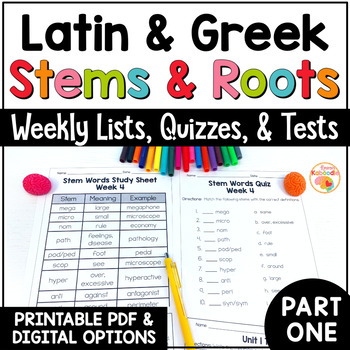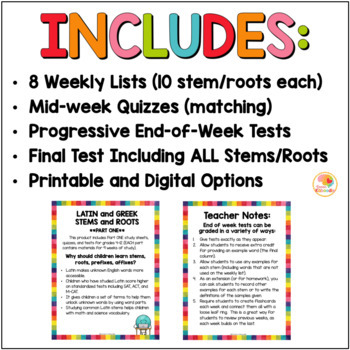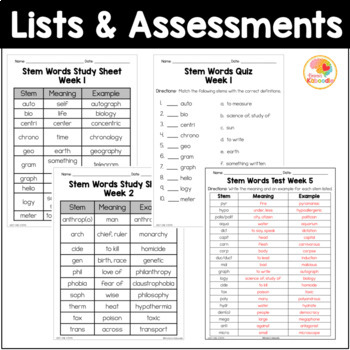Greek and Latin Roots: Root Words Lists & Quizzes for 3rd 4th 5th 6th Grade
- PDF
- Google Apps™

What educators are saying
Also included in
- Greek and Latin Root Words Weekly Lists, Quizzes, and Tests BUNDLE:This Latin and Greek roots and stems UNIT ONE AND UNIT TWO BUNDLE is perfect for teachers who want their students to learn common Greek and Latin roots. Each unit includes:Weekly lists (10 words on each list for eight weeks)A mid-wePrice $10.75Original Price $15.00Save $4.25
Description
Greek and Latin Roots Words Weekly Lists, Quizzes, and Tests UNIT ONE:
This Latin and Greek Stems and Roots UNIT ONE file includes:
- Weekly lists (10 words on each list for eight weeks)
- A mid-week matching quizzes
- End-of-week tests (which are progressive and include stems from prior weeks)
- Final test with all 80 stems/roots
The test at the end of each week has 20 questions (except the first week only has 10 because there isn't an established pool to pull additional parts yet). For the ninth week, there is a final test with all 80 Latin and Greek Stems and Roots.
Since each week builds on the previous week, the retention of information remains high. My students will keep a ring with the stems and roots flashcards on them in their desks/backpacks and will add ten new stems each week, so that they can study ALL the stems each week, not just the new ones for that week.
Why should students learn to use Latin and Greek stems and roots?
- It is part of the COMMON CORE CURRICULUM
- Latin makes unknown English words more accessible
- Children who have studied Latin score higher on standardized tests including SAT, ACT, M-CAT
- It gives children a set of terms to help them unlock unknown words by using word parts
- Studying common Latin stems helps children with math and science vocabulary
This file is the FIRST UNIT (a total of NINE weeks).
♥ If you would like to check out the SECOND UNIT (an additional NINE weeks), click here:
♥ If you would like to purchase the BUNDLED UNIT ONE AND UNIT TWO files together at a reduced price, click here: BUNDLED UNIT ONE AND TWO
NOTE: THIS FILE INCLUDES A DIGITAL DISTANCE LEARNING OPTION!
This product includes a digital option (as well as the no prep printable option). The instructions for utilizing the digital portion appear at the end of the packet.






